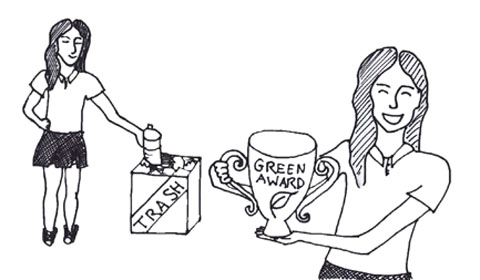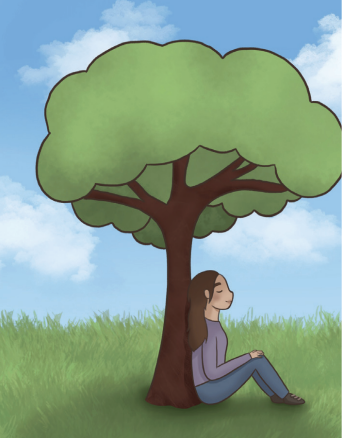
The School often capitalizes on the environmental friendliness of Marlborough’s campus and policies. Placards around campus show off our latest Water Use Reduction initiatives. Our newly constructed Munger Hall, a sizable and costly endeavor, earned a Silver-level LEED (Leadership in Energy and Environmental Design) Certification. However, we at The UltraViolet are concerned that the School seems to focus on ambitious and press-worthy green projects at the expense of less recognizable but perhaps equally efficient initiatives. We do not doubt that the School is genuinely concerned about our environmental impact, but we feel that Marlborough could expand its efforts to diminish the damage we inflict on our environment.
The School actively seeks to maintain its stellar reputation in all areas. However, we feel that the School occasionally places a greater emphasis on upholding a good “green image” than on considering the most efficient solution to a problem. For example, we have three separate types of waste bins on campus—one each for trash, paper and plastic bottles. However, at the end of the day the items in all bins are combined and taken to the same facility, where they are then sorted into recyclable and non-recyclable waste. Why do we bother buying multiple types of waste bin if everything goes to the same place? Although the School says that the three separate bins will educate and train students to sort waste later in life, this practice seems to have more to do with appearances than with environmental impact.
Printers in Munger Hall have shelled out approximately 1,209,152 sheets of paper in the past year, only a fraction of which get claimed by students, who often get frustrated and print the same document multiple times. Director of Academic and Administrative Technology Stuart Posin has programmed 90% of all printers on campus to print double-sided, but we suggest the School consider electronic alternatives to printing to further fix this waste of trees. For example, Haiku LMS offers Dropboxes, where students can hand in an electronic document through their class Haiku page. The teacher can even edit the document on her computer and then send a reply back to the student. Encouraging all teachers to switch to this system would greatly lower the number of pages printed.
The School has also made a major push to supply Café M with ingredients grown right on campus, from a garden at the side of Booth Field maintained by the Seedling Project, a student-run organization. Though the Seedling Project website asserts that the garden supplies food to the Café on a weekly basis, members of the Café staff said they receive items such as rosemary, basil and carrots only once or twice a month, from girls who have picked the produce themselves. While we applaud the administration’s attempt to make our lunches more sustainable, we wonder whether the amount of water used to maintain the garden actually compromises the project’s environmental benefits, especially since a miniscule amount of produce consumed by students comes from the garden.
When The UltraViolet staff is at School late into the evening, we often notice that classroom lights are still turned on for no reason. Although the cleaning staff is supposed to turn classroom lights off right after School ends, this does not always happen. We suggest that the School install motion sensing lights, like the ones currently used in Munger Hall, all over campus to reduce our energy waste.
Additionally, students purchase many plastic water bottles each day, which require massive amounts of oil and water to produce. If plastic bottles were eliminated from the Café or cost considerably more than the current price of $1.85, girls would have increased incentive to bring reusable bottles to School and fill them at the automated filtered water machines located around campus.
The UltraViolet does not disagree with the measures that the School has taken to make our campus greener. We simply feel that sometimes Marlborough focuses on press-worthy projects when simpler changes would be just as helpful in reducing our environmental footprint.




